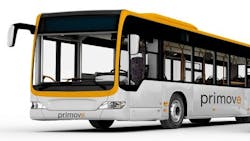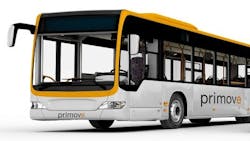Wireless Inductive Charging to Power Urban Transport
Germany's regional operator Rhein-Neckar-Verkehr GmbH (RNV) is redefining e-mobility for public transport services of the future. During the "PRIMOVE Mannheim" research project, electric buses will recharge wirelessly while passengers get on and off the vehicles at bus stops along the inner city route 63. The project will prove that electric buses can operate daily passenger services, even on demanding routes.
During an initial period of 12 months, two completely electrically powered and inductively charged electric buses will be tested in daily passenger operation on the existing RNV bus route. Both e-buses, built by the Swiss manufacturer Carrosserie HESS AG, are also equipped with the new BOMBARDIER MITRAC e-bus powertrain for city buses. In addition, an electric van equipped with wireless PRIMOVE technology will be tested as a RNV service vehicle.
The project will help to determine a framework for infrastructure, batteries, inductive energy transfer and daily operation by testing the new technology on a real-life route. The project partners aim to prove that a technology transfer towards e-mobility is viable. They will also gain insights into further improving low-emission public transport systems by focusing on the operating efficiency of daily transport services.
Bombardier's invisible PRIMOVE charging technology is based on inductive energy transfer. It is installed entirely under the road surface and under the floor of the vehicles. The charging process begins as soon as the vehicle completely covers the charging segment. Jérémie Desjardins, Business Leader PRIMOVE, Bombardier Transportation, said: "PRIMOVE technology enables electric buses to serve routes originally designed for conventional buses operating to tight timetables. It fully integrates the charging process into normal bus operations so you don't need more vehicles than with current diesel bus fleets. We combine smaller, lighter batteries with the principle of fast opportunity charging to produce enough energy for a whole day's travel and increase the batteries' lifespan considerably."
The project partners will initially test the PRIMOVE technology during a testing and approval phase to collect information for the subsequent scheduled passenger operations, as well as for RNV's internal operations and its training of personnel. Innovative features of the project include the planned optimization of the charging process by evaluating real-time data on the vehicle's position on the route and its battery's level of charging.
The Karlsruhe Institute of Technology's department for vehicle systems technology will provide the project with scientific support under the direction of Prof. Dr.-Ing. Peter Gratzfeld. The research will focus on an energy simulation that demonstrates the entire power flow in the electric buses and at the inductive charging stations. This will allow the battery size and the charging infrastructure to be perfectly adapted to each other and determine the demands on the power supply network. The institute's work will also confirm the greater energy efficiency of the system compared to conventional propulsion methods. An extensive measurement program will verify the results of the simulations when the electric vehicles enter passenger service.

